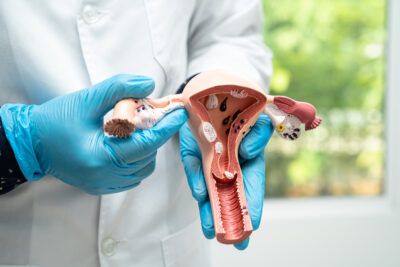Semmelweis University, together with the Hungarian University of Agriculture and Life Sciences (MATE), investigated the presence of mycotoxins in the follicular fluid of women undergoing in vitro fertilization (IVF).
Mycotoxins are naturally occurring toxins produced by molds on crops and foodstuffs like grains, nuts, spices, and dried fruits. They can cause oxidative stress, DNA damage, and even cancer.
While they also pose a fertility risk, their impact on women’s reproductive health has not been researched.
“We wanted to understand the mechanisms through which mycotoxins affect follicle development and consequently IVF success”, says dr. Levente Sára, associate professor at the Department of Obstetrics and Gynecology, Semmelweis University, corresponding author of the study.
Twenty-five patients were included in the study, whose follicular fluid and blood samples were analyzed for most common mycotoxins: Deoxynivalenol (DON), α-Zearalenol (α-ZOL) and Zearalenone (ZEN), total aflatoxins (AFs), Fumonisin B1 (FB1), T-2/HT-2 toxins. These substances, which occur mostly in agricultural crops; grains, cottonseed, peanuts, etc., can enter the follicular fluid from the bloodstream, where they may cause inflammation, oxidative stress, and hormonal imbalance/disruption in the endocrine system.
All mycotoxins examined were detected in the follicular fluid of the patients, even when they were not found in the blood plasma at the same time.
Levels of DON, α-ZOL, ZEN, and total aflatoxins were significantly higher in the follicular fluid than in the blood. The researchers found a correlation between estradiol concentrations and the presence and levels of ZEN, one of the most abundant xenoestrogens in the follicular fluid suggesting they reinforce each other by increasing the number of estrogen receptors. They also found high levels of Fumonisin B1 has had a positive effect on the ratio of follicles to oocytes retrieved.
Our study confirms the presence of mycotoxins in follicular fluid and suggests that mycotoxins may influence reproductive outcomes, including oocyte/egg cell quality and hormone levels
, says first author dr. Apolka Szentirmay of the Department of Obstetrics and Gynecology, Semmelweis University.
Senior research fellow dr. Zsuzsanna Szőke of the Institute of Genetics and Biotechnology at MATE, corresponding author of the study emphasized that “in this field, research with a multidisciplinary approach—utilizing the combined results from human and agricultural sciences—seeks to identify the causes of infertility of unknown origin. Facing the distinct challenges across obstetrics and gynecology, embryology, toxicology, biotechnology, and analytics, our multidisciplinary team has succeeded in uncovering new insights into how exposure to mycotoxins in follicular fluid impacts follicular development.”
Chronic, low-dose exposure to these toxins may have long-term effects on reproductive health, the authors note stressing the need for better monitoring of mycotoxin contamination in the food chain.
The research was granted by the Richter Research Grant RG-IPI-2023-TP17/026 and by the Hungarian National Laboratory Project, grant number RRF-2.3.1-21-2022-00007, Agribiotechnology and Precision Breeding for Food Security National Laboratory.
Zsófia Végh
Cover photo (illustration): iStock by Getty Images – asadykov


